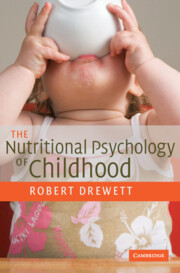Book contents
- Frontmatter
- Contents
- List of illustrations and table
- Preface
- 1 Introduction
- 2 The development of feeding behaviour: infancy
- 3 The development of feeding behaviour: weaning onwards
- 4 Born too small or born too soon
- 5 Nutritional deficiencies
- 6 Nutritional aspects of some physical conditions
- 7 Failure to thrive
- 8 Adiposity and obesity
- 9 Adolescence and the eating disorders
- 10 Some concluding thoughts
- References
- Index
5 - Nutritional deficiencies
Published online by Cambridge University Press: 22 September 2009
- Frontmatter
- Contents
- List of illustrations and table
- Preface
- 1 Introduction
- 2 The development of feeding behaviour: infancy
- 3 The development of feeding behaviour: weaning onwards
- 4 Born too small or born too soon
- 5 Nutritional deficiencies
- 6 Nutritional aspects of some physical conditions
- 7 Failure to thrive
- 8 Adiposity and obesity
- 9 Adolescence and the eating disorders
- 10 Some concluding thoughts
- References
- Index
Summary
Iron deficiency
There are potentially many types of nutritional deficiency, because food contains many different nutrients. Golden (1995) classifies them into two types. Type 1 nutrients are needed for specific metabolic functions, and deficiencies in these nutrients lead to specific clinical signs that are characteristic of deficiency diseases, such as beri-beri (a result of vitamin B1 or thiamine deficiency), scurvy (vitamin C or ascorbic acid deficiency), xerophthalmia (vitamin A or retinol deficiency). There are body stores of most of the nutrients in this class. When consumption of the nutrients is inadequate, growth continues but the body stores of the nutrient are used up, leading to the specific clinical signs. These deficiencies can be measured biochemically (for example, by measuring thyroxine in iodine deficiency disorders). Type 2 nutrients, on the other hand, are needed for metabolism in general in all the tissues and organs of the body. These include the components of protein, but also, for example, zinc, potassium, sodium and magnesium. There are no body stores of most of these nutrients except the normal tissues of the body. So rather than leading to specific nutritional deficiencies with specific clinical signs, an inadequate intake of any of these nutrients leads to a generalised growth failure. There are no specific biochemical tests for these deficiencies. They are normally detected by the associated growth failure, measured anthropometrically.
- Type
- Chapter
- Information
- The Nutritional Psychology of Childhood , pp. 88 - 109Publisher: Cambridge University PressPrint publication year: 2007



